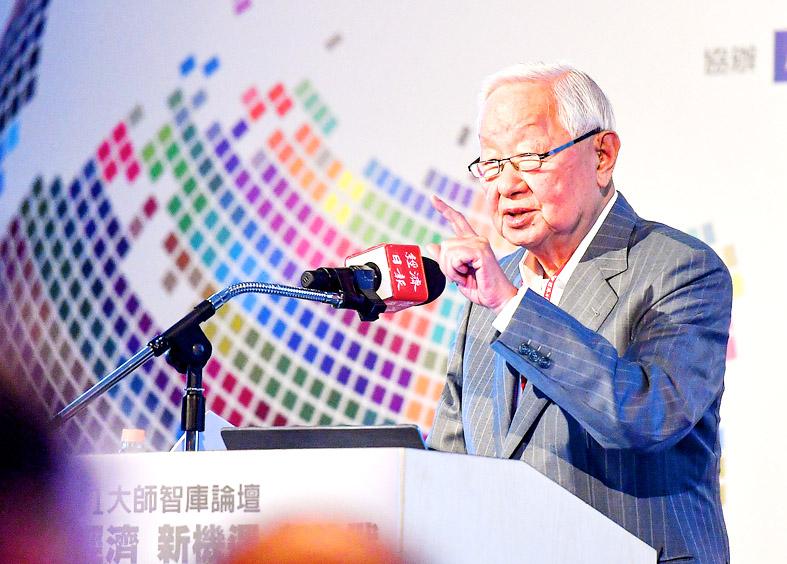Taiwan still leads the US and China in chipmaking, but it would be difficult for another local company to duplicate the success of Taiwan Semiconductor Manufacturing Co (TSMC, 台積電), the firm’s founder, Morris Chang (張忠謀), said on Wednesday.
Speaking at a seminar on Taiwan’s competitiveness in chip production, the 89-year-old Chang said that Taiwan’s talent pool of quality engineers, technicians and factory workers is the main reason it has excelled in the semiconductor foundry business.
Another factor is Taiwan’s transportation network, which allows large and quick transfers of personnel in the country, he said at the seminar hosted by the Economic Daily News.

Photo: CNA
Chang, who retired from TSMC in 2018, also lauded the company’s professional managers, saying their leadership and devotion to research and development, coupled with workers’ efforts, and government and local support, had helped TSMC evolve into a world-class company.
The US, on the other hand, saw a decline in manufacturing decades ago, and has been focusing instead on research and development, and the financial sector, he said.
Although the US government has been increasing funding for its semiconductor industry, Chang said that he is not worried, because production costs are significantly higher in the US than in Taiwan.
Short-term federal and state subsidies would do little to reverse the US’ competitive disadvantage in the long term, he said.
China has spent tens of billions of dollars over the past 20 years to nurture its domestic companies, but their semiconductor manufacturing process lags behind TSMC’s by at least five years, and their logic IC design is also one to two years behind that of Taiwan and the US, he added.
Samsung Electronics Co is TSMC’s only strong competitor, because South Korea also has a vibrant manufacturing sector and a competitive talent pool similar to Taiwan’s, he said.
Despite Taiwan’s advantage in the semiconductor industry, it would not be easy for another domestic firm to duplicate TSMC’s role as the world’s leading dedicated semiconductor foundry and a protective shield that underpins Taiwan’s economy, Chang said.
“It will be difficult” to find another company that is so important to the rest of the world and holds such a large global market share and competitive edge, he added.
Founded in 1987 by Chang as a chip foundry business, TSMC has become enormously important, as the global information technology sector is highly dependent on its products.
It has been called a “protective sacred mountain” for Taiwan against China, amid Beijing’s technology dispute with Washington.
Semiconductor wafer manufacturing is extremely important to people’s livelihood, the economy and national defense, Chang said.
Last year, TSMC’s market capitalization topped US$600 billion, the highest among semiconductor companies.

TAKING STOCK: A Taiwanese cookware firm in Vietnam urged customers to assess inventory or place orders early so shipments can reach the US while tariffs are paused Taiwanese businesses in Vietnam are exploring alternatives after the White House imposed a 46 percent import duty on Vietnamese goods, following US President Donald Trump’s announcement of “reciprocal” tariffs on the US’ trading partners. Lo Shih-liang (羅世良), chairman of Brico Industry Co (裕茂工業), a Taiwanese company that manufactures cast iron cookware and stove components in Vietnam, said that more than 40 percent of his business was tied to the US market, describing the constant US policy shifts as an emotional roller coaster. “I work during the day and stay up all night watching the news. I’ve been following US news until 3am

UNCERTAINTY: Innolux activated a stringent supply chain management mechanism, as it did during the COVID-19 pandemic, to ensure optimal inventory levels for customers Flat-panel display makers AUO Corp (友達) and Innolux Corp (群創) yesterday said that about 12 to 20 percent of their display business is at risk of potential US tariffs and that they would relocate production or shipment destinations to mitigate the levies’ effects. US tariffs would have a direct impact of US$200 million on AUO’s revenue, company chairman Paul Peng (彭雙浪) told reporters on the sidelines of the Touch Taiwan trade show in Taipei yesterday. That would make up about 12 percent of the company’s overall revenue. To cope with the tariff uncertainty, AUO plans to allocate its production to manufacturing facilities in

Six years ago, LVMH’s billionaire CEO Bernard Arnault and US President Donald Trump cut the blue ribbon on a factory in rural Texas that would make designer handbags for Louis Vuitton, one of the world’s best-known luxury brands. However, since the high-profile opening, the factory has faced a host of problems limiting production, 11 former Louis Vuitton employees said. The site has consistently ranked among the worst-performing for Louis Vuitton globally, “significantly” underperforming other facilities, said three former Louis Vuitton workers and a senior industry source, who cited internal rankings shared with staff. The plant’s problems — which have not

COLLABORATION: Given Taiwan’s key position in global supply chains, the US firm is discussing strategies with local partners and clients to deal with global uncertainties Advanced Micro Devices Inc (AMD) yesterday said it is meeting with local ecosystem partners, including Taiwan Semiconductor Manufacturing Co (TSMC, 台積電), to discuss strategies, including long-term manufacturing, to navigate uncertainties such as US tariffs, as Taiwan occupies an important position in global supply chains. AMD chief executive officer Lisa Su (蘇姿丰) told reporters that Taiwan is an important part of the chip designer’s ecosystem and she is discussing with partners and customers in Taiwan to forge strong collaborations on different areas during this critical period. AMD has just become the first artificial-intelligence (AI) server chip customer of TSMC to utilize its advanced